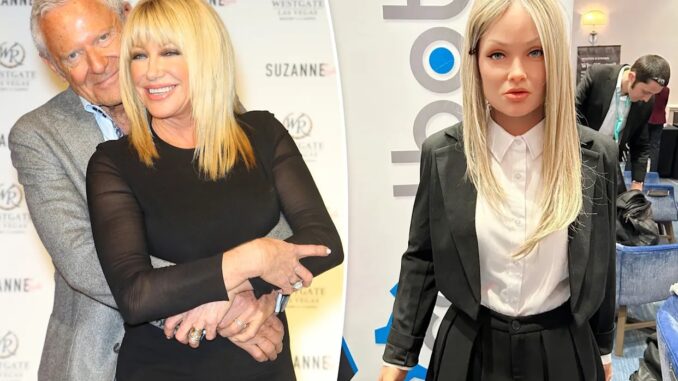
In a world increasingly fascinated by artificial intelligence, celebrities are stepping into the digital spotlight in ways previously unimaginable. Suzanne Somers, iconic actress, author, and wellness advocate, has ventured into this new frontier with her own AI version. But the pressing question is: is it really necessary? Can a digital recreation ever compete with the charm, personality, and human authenticity of the original Suzanne Somers? Let’s dig deeper into this trend, its purpose, its potential, and the lingering debate about authenticity versus innovation.
The Rise of AI in Celebrity Culture
Artificial intelligence is changing how we interact with celebrities. From digital avatars to AI-powered voice assistants, technology is bridging the gap between fans and stars.
What AI Versions Offer
AI versions allow fans to engage with celebrities in ways that are impossible in real life—think virtual interviews, interactive content, and immersive experiences.
Why Celebrities Explore Digital Twins
For stars like Suzanne Somers, AI versions are a new platform for engagement, branding, and extending their legacy. But does novelty justify replacing—or even supplementing—the original presence?
Understanding Suzanne Somers’ AI Version
Her AI version is designed to mimic her voice, expressions, and personality traits. Developers trained it using hundreds of hours of footage, interviews, and media appearances.
The Technology Behind the AI
Machine learning, deepfake technology, and advanced voice synthesis create an interactive digital persona that looks and sounds remarkably like Suzanne.
The Goal of the AI Version
The purpose is to provide fans with a unique, interactive experience, allowing them to “converse” with Suzanne in ways previously impossible.
Comparing AI and Human Authenticity
One of the core debates is whether a digital version can replicate the depth and charm of the original celebrity.
Can AI Capture Personality?
While AI can mimic speech patterns and humor, spontaneity, emotion, and nuanced reactions are still uniquely human. Suzanne’s charm and wit aren’t just data—they’re lived experiences.
Emotional Depth Matters
Fans connect with the real Suzanne because of her authenticity, vulnerability, and warmth—qualities that an AI simulation struggles to replicate.
The Case for AI Versions
Proponents argue AI recreations have tangible benefits.
Accessibility for Fans
AI versions allow global audiences to interact with stars who may not always be physically available for events, interviews, or promotions.
Creative Possibilities
Digital personas can appear in new media formats, host virtual shows, or collaborate with other AI celebrities, opening creative opportunities that the original might not pursue.
Preserving Legacy
AI can maintain a celebrity’s public presence even after they reduce appearances, helping to preserve legacy and introduce the brand to younger generations.
The Case Against AI Versions
Critics argue that some things are simply irreplaceable.
The Uncanny Valley
Even the most advanced AI can feel slightly off, triggering discomfort known as the “uncanny valley.” Fans often sense something is missing—subtle quirks, authentic emotion, or human imperfection.
Redundancy vs. Necessity
Does creating an AI version truly serve fans, or is it just a marketing gimmick? If the real Suzanne is still active, engaged, and accessible, why risk diluting her authentic presence?
Fan Reactions to Suzanne Somers’ AI

Public opinion has been mixed.
Enthusiastic Curiosity
Many fans enjoy the novelty, finding it entertaining and fascinating to interact with a digital Suzanne.
Skepticism and Concern
Others question the necessity, worrying that AI versions might replace human engagement or misrepresent the celebrity’s personality.
Ethical Considerations
Creating AI versions of real people raises complex ethical questions.
Consent and Control
Even with Suzanne’s approval, ethical concerns arise about AI misuse or the replication of likenesses without proper oversight.
Influence on Legacy
Digital versions can influence public perception, potentially overshadowing or altering how fans experience the real individual.
The Technology Is Impressive, But…
While the AI is technically sophisticated, impressive graphics and voice replication can’t replicate lived experiences, humor, or emotional authenticity.
Visual Realism
The AI’s facial expressions and gestures are remarkably accurate, yet small inconsistencies can make interactions feel less human.
Speech and Timing
Voice synthesis captures tone and cadence, but improvisation and wit—hallmarks of Suzanne’s charm—remain difficult to recreate authentically.
Can AI Replace Human Engagement?
The short answer: no. AI can supplement, enhance, or entertain, but it cannot replace genuine human connection.
Spontaneity and Wit
Suzanne’s humor comes from intuition, cultural awareness, and timing—traits that AI struggles to emulate.
Authentic Emotional Responses
Fans appreciate her empathy, spontaneity, and relatability—qualities that cannot be fully encoded in algorithms.
Use Cases Where AI Adds Value
AI can shine in specific contexts:
Virtual Events and Promotions
AI versions can appear in virtual spaces or host digital campaigns, expanding reach without replacing real appearances.
Interactive Storytelling
AI can create engaging narratives, educational content, or wellness tips from Suzanne’s persona, providing a digital extension of her brand.
Limitations and Risks
Even with benefits, AI comes with risks.
Misrepresentation
An AI version could unintentionally portray Suzanne in ways that don’t align with her true personality.
Over-Reliance on Technology
Fans may become detached from the real person if AI interactions dominate, potentially reducing authentic engagement.
Striking a Balance
The best approach may be using AI to complement, not replace, the original.
Enhancing the Real Suzanne
AI can provide additional content, fan interactions, and creative opportunities while leaving core human engagement intact.
Maintaining Authenticity
Keeping the real Suzanne at the forefront ensures the AI version never overshadows her legacy or dilutes her authenticity.
Conclusion
No copy can ever truly replace the original Suzanne Somers. While her AI version is technically impressive, offering novelty, interactive experiences, and creative possibilities, it cannot replicate the warmth, spontaneity, and authenticity that have made her beloved for decades. The AI serves as a complement—a tool to enhance her presence and legacy—but it’s not necessary for those who cherish the real Suzanne. In the end, fans will always return to the genuine article, whose charm, wit, and humanity remain irreplaceable.
